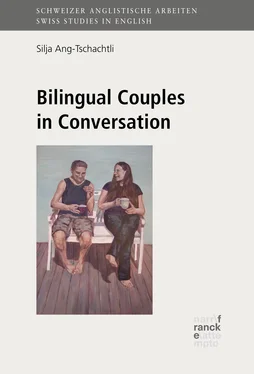Dean (English, 29) and Monika (Swiss, 29)
Monika and Dean met through mutual friends in 1999 while Monika was staying in London for a year. She had just finished grammar school in Zurich and had moved to London, where she was working as a language teacher. When Monika moved back to Switzerland to finish her studies the year after, Dean followed her. After many unsuccessful applications, he finally found a position, but in order for him to be allowed to stay in Switzerland, the couple had to get married. Reluctantly, they decided to marry legally at the age of twenty; however, they only celebrated their wedding eight years later. Dean does not have a university degree and works in IT recruitment. Monika, who has a master’s degree in English language and literature from the University of Zurich, works as an English teacher at a grammar school. She grew up in a town near Zurich. At the time of the interview, the couple had been together for nine years and had been married for eight years. Monika and Dean speak English to each other almost exclusively, although Dean is fairly fluent in German and understands almost everything. They hardly ever mix languages, with the exception of the occasional term they borrow from the other language.
Joshua (American, 30) and Deborah (Swiss, 28)
Joshua and Deborah met in 1998 when Joshua travelled to Europe as a missionary for the Church of Jesus Christ of Latter-day Saints. Deborah is a member of the same church, and her family invited Joshua over for dinner on a regular basis. Deborah and Joshua were not allowed to pursue a romantic relationship during Joshua’s assignment, but he returned to Switzerland shortly after and they started dating. Deborah was 18 at the time and Joshua was 20. Joshua is originally from Utah, where he attended university for three semesters, but when he moved to Switzerland, he had to complete the British A-Levels to be allowed to enrol at the University of Zurich. He was finishing his master’s degree in English language and literature at the University of Zurich at the time of the interview and intended to become a teacher afterwards. To support their family, he was also working part-time at a law firm. Deborah, who grew up in the Zurich area, has a Swiss Academic Baccalaureate (“Matura”) and did temporary work before becoming a stay-at-home mother to their two young girls. The couple had been together for ten years, had been married for eight years, and were expecting their third child. Deborah and Joshua are the only couple among the interviewees who do not use mostly English with each other. Deborah did not feel comfortable speaking English when they met, and Joshua’s German was already very good at that point. Initially, they spoke to each other in Standard German, then they switched to Swiss German, and later they started mixing English and Swiss German. Now that they have children, they mix less and try to speak one language at a time when with their children. They raise their children bilingually using a “one parent, one language one parent, one language strategy ” strategy.
Craig (American, 32) and Katia (Swiss, 28)
Craig and Katia met in February 1997 when Katia spent a high school exchange year in Texas. Craig was completing an internship for his university degree at the time and staying with the same family as Katia’s friend, an exchange student from Denmark. Katia was 17.5 and Craig was 22 when they met. At the end of her exchange year, Katia returned to Switzerland to graduate from grammar school. After maintaining a long-distance relationship for four years, Craig, who is an electrical engineer, lost his job in the USA, found one in Switzerland, and moved there permanently in 2002. He works in an English-speaking environment but has learnt (Swiss) German in order to converse with Katia’s family and friends. Katia holds a master’s degree in human movement sciences and sport and works as a grammar school teacher. At the time of the interview, they had been together for 10.5 years and had been married for three years. They have a two-year-old daughter whom they are raising bilingually. Craig and Katia usually speak English to each other, unless they are in the company of native speakers of (Swiss-)German. They also mix languages sometimes, if they cannot think of a word in the language that they are speaking or if there is a phrase in either of the languages that fits the situation better. However, they are now trying to avoid code-switching in the company of their daughter, as they find it important to each use one language when communicating with her.
Karen (American, 51) and Philipp (Swiss, 47)
Philipp and Karen met at the University of Minnesota in 1989 when Philipp was studying there for a year. Karen was working as a campus minister, and Philipp was her best student. He went back to continue his studies at the University of Zurich, but returned to Minnesota for another exchange year in 1991. After his return to Switzerland, they had a long-distance relationship until Karen managed to find a teaching job in Switzerland; they married the same year. Philipp has a master’s degree in English language and literature, and Karen in education, and they both work as English teachers. Philipp teaches English at two different Swiss grammar schools, and Karen teaches business English at a University of Applied Sciences and Arts (“Fachhochschule”). At the time of the interview, they had been together for 24 years. They have three teenage children, whom they have raised bilingually, and a large network of friends who are native speakers of English. The couple speak English almost exclusively to each other. Philipp and their children also mix languages at times, but Karen does so only very rarely, apart from a few terms that she uses in Swiss German. Karen does not feel very comfortable speaking or writing in German; however, she actively seeks out situations which require passive knowledge of the language.
The couples’ biographies show that, in many ways, these relationships are different from the ones frequently depicted in previous research. For instance, Khatib-Chahidi, Hill and Paton reported that many of their subjects married nationals of other countries because they were feeling marginalizedmarginalization (structurally, socially or personally) (1998: 57, cf. section 3.2.2, “Bicultural couples”). None of these aspects were mentioned by any of the respondents in my study, and none of the twenty interviewees depicted their partner as a “way out”. Moreover, the women in Khatib-Chahidi, Hill and Paton’s study reported that they had had intensive contact with other foreigners before meeting their spouse (as had their spouse, since they met in the women’s home country) (1998: 57). While this is also true for most Swiss interviewees in my study, many of the English-speaking partners had very little if any contact with Swiss or other German-speaking foreigners before meeting their partner. To my knowledge, none of my interview subjects had had previous (long-termrelationshiplong-term) partners from other cultures. There are some similarities, however, to the bilinguals in Piller’s (2002a) sample. For instance, many of the Swiss participants expressed very positive feelings about the English language, although only one Anglophone participant (Joshua) had similarly positive feelings about Swiss German (see section 7.4.2, “Anglophone partners’ attitudes”).
There are a number of particularitieschallengesmethodological of the composition of the sample that should be borne in mind for the analysis. The English-speaking partners are from a variety of different cultural backgroundscultural background, which might skew trends with regard to certain linguistic behaviour (such as swearing or language mixing) or influence the use of suprasegmental features. The Anglophone partners’ cultural background and variety of Englishvarietyof English may also influence the participants’ attitudes, and thus, potentially, their language choice. Moreover, there is a slight imbalance with regard to the educational leveleducationlevel of of the participants, as there are more English-speaking partners with no tertiary education than there are Swiss partners. Conversely, the sample is relatively balanced with regard to gender in combination with other factors like the age and educational level of the participants: The educational level of the female partners is slightly higher on average than that of the male partners, and the gap in the average age of the male and female participants, as well as the Swiss and English-speaking participants, is minimal (less than a year in both cases).
Читать дальше












